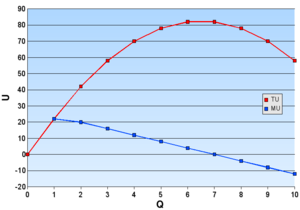Many idealists focus to a large degree to the form a future society will have. But this is the least important part. It’s much more important to figure out a concrete path to it.

- Image by AFP/Getty Images via Daylife
I’ve spend a hefty chunk of the last 3 days arguing with various strands of market anarchists ((I will use this term to define those who support a stateless society where usury (wage-labour, rent & interest) is possible and a free market handles distribution)) where the discussion mainly centered around the form and limitations of the future society.
This is a main trend I’ve noticed from those Anarchists and “Anarchists” who espouse mainly the Austrian analysis of economics; the trend to emphasise a future possible reality and how in the ideal situation the free market would work in the best possible manner. However, in an idealized society, any system can work. Anyone can in their head imagine all the necessary factors that will have to exist in order to make the system run.
The problem however is that reality never conforms to the ideal. Any perfect system imagined in our head will always fall far shorter than practice and this is not because the person thinking about it is stupid, but simply due the sheer immensity of factors one must account for. One will always consider the problems he is most familiar with and their solutions, but for every situation one resolves, there’s a 100 we haven’t thought of and another 100 we can’t even consider because they will only appear in the future.
These kind of ideal systems are utopias. They work only because they are a shortened version of reality, only detailed to the extend that the original thinker and his followers have thought about potential problems and their solutions.
And the reasons why Utopias fail, is because the thinkers have wasted all their time imagining how the end result might be, and very little to plan how to get there. But the second part is the only thing that matters. In fact, I would go as far as to say that the particulars of any future society are almost not important at all. It’s the base that’s important. The main idea that permeates the future society that we want to achieve is enough to be painted in rough colours, and let the future people add the details
To speak for myself, I suggest egalitarianism. A future society where people will be equal in power. I maintain that as long as equality in power exists, coercion (active and passive) will be impossible and as a result true freedom will flourish. This a broad stroke, but it’s enough. And the benefit of such broad strokes is that it allows people to concentrate on getting the baseline right, rather than bickering over the details. It also directs the energy to the part that is most important. Getting there.
However, market anarchists seem to miss 2 important points: The difficulty of using free market tactics to get rid of distortions of power and the fact that the means strongly colour the ends.
The first part is almost obvious from today’s society. In a free market where (gross) inequality exist, the power keeps flowing towards the powerful. This happens because money is power, and in any market exchange between unequal individuals will benefit the strongest over the weakest. This allows the strongest to use all means at their disposal in order to protect their position, and one of those means is the state.
As such, it is silly to expect these people, the ruling class, to embrace the Free Market, to voluntary reduce the protectionism they enjoy and the like. If they start to do so, then it can only be because it is to their benefit. But it is equally silly to expect free market tactics to work immediately post-revolution. A revolutionary society will not immediately arrive at the end of the road, in fact the biggest challenge will only be starting. That path will be the most crucial, with counter-revolutionaries waiting for a chance to return to the old system, relics of the previous society standing which will need to be dismantled and many people who still think by the old values.
To attempt and go directly to a free market economy at this point would be to ignore the fact that the free markets exarberate inequality.
Which leads us to the second problem. Mainly that the path ones takes is what defines the end one will have. If we have a revolution, the methods by which it will happen will define the immediate post-revolutionary organizations we will have. And those organizational methods will define how the society will slowly evolve to its newer form.
To give you an example, if a revolution happens due to syndicalist action (say larger and larger strikes and takeovers) then these unions will be the classic form around which a society will condense as the heat of action cools down. People will then continue working with the organizational form which has proven successful to them, forming federations and confederations of syndics and so on. Thus, they will have small incentive to switch to a system they are not familiar with.
This poses a tricky problem for those who envision a different kind of ideal society. Taking market anarchism again, if we accept that free market tactics and rhetoric cannot take down the current system (because they will promote the current distribution of power), then this means that market anarchists will have to support another type of organization that has a chance of revolt. But once this happens, people will still need to deal and extinguish relics of the previous system, on which a free market cannot stand (as it needs an idea society remember?).
So at which point will these piggy-backing market anarchists get to put their system into action? If they wait until the system solidifies in an anarchist form, it will be already too late. The system will be communist, syndicalist or whatever. There will be no further reason for reform. If they try to take over soon after the revolution, then the lingering inequalities and mentality will take hold and possibly defeat the whole thing.
The only chance then left for idealists, is to somehow prove that they have some means of provoking an anarchist revolution in the first place which will then be able to progress towards the perfect free market. Or to expect that a future non-market society will be so unstable that it will voluntarily cry out for the free market. To tell the truth, the later does not really worry me, as long as market anarchist support a social revolution now. And the former has not yet, provided any convincing (to me) methodology.
For those idealists of the free market though, who do not see any path towards it; to stick to the ideology is simply useless. If you can’t figure out how to achieve it (and no, I do not consider begging the government to be a viable tactic) then you might as well not waste your time thinking about it. If you think you can only get there once the socialists have created an egalitarian society, then start struggling for that and don’t waste our time about the Free Market.
And if you are of those few that think there is a way through free market tactics, then you’d better have a damn good excuse on why these tactics can work, even though the free market theory is only valid for a very particular society in the first place.
![Reblog this post [with Zemanta]](https://i0.wp.com/img.zemanta.com/reblog_e.png?w=980)








